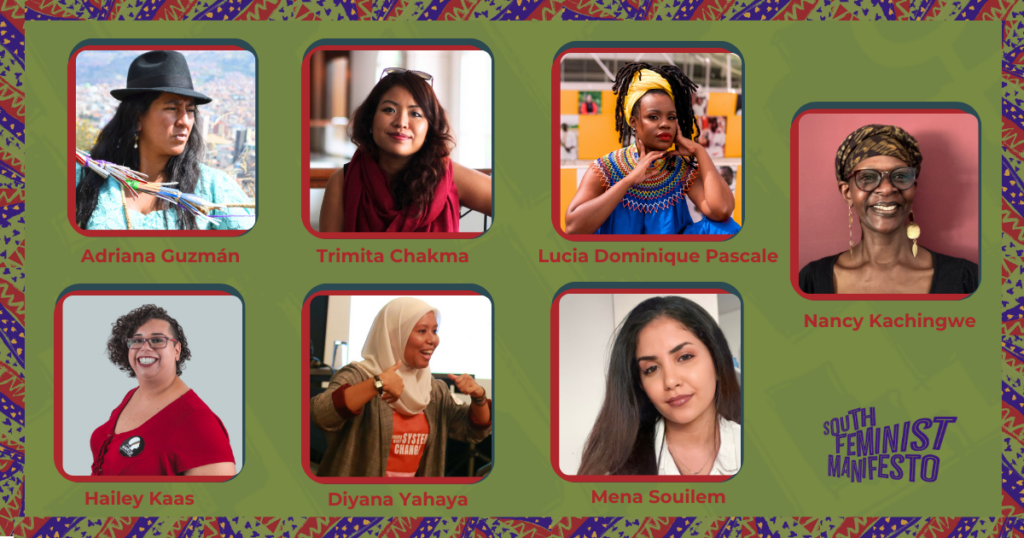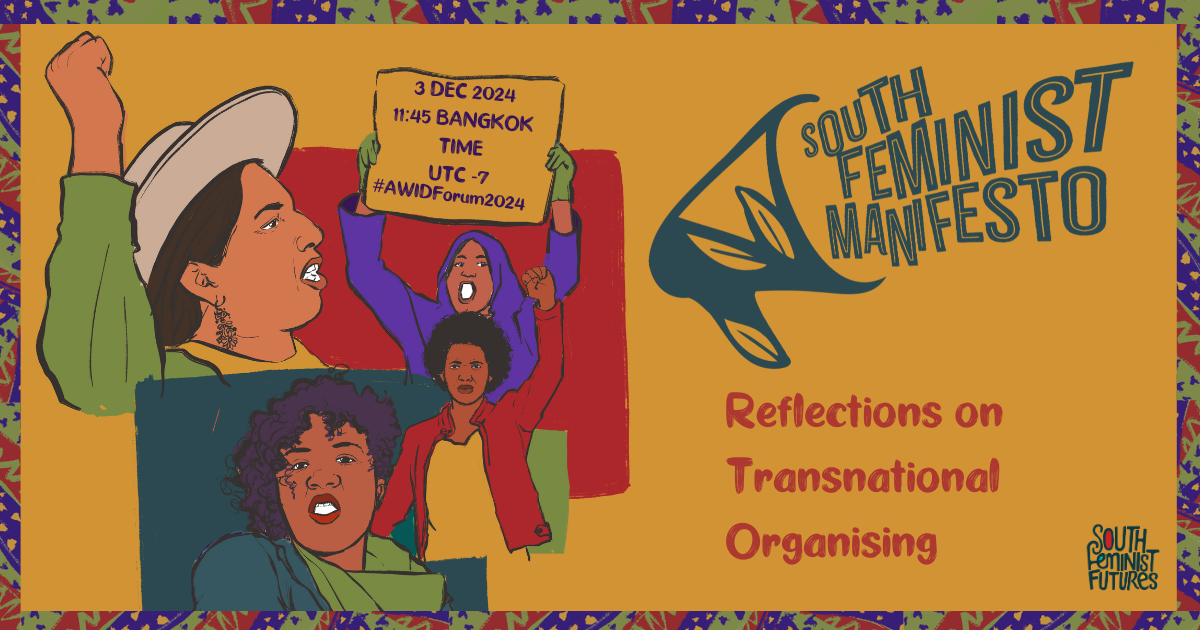From 2 to 5 December, South Feminist Futures will join more than 3,000 feminists from all over the world at the 15th AWID International Forum in Bangkok.
We are pleased to invite you to our session in person or online “A Global South Feminist Manifesto: Reflections on the Experience of Transnational Organising”
Date: 3 December 2024
Time: 11h45-13h00 Bangkok Time (UTC – 7)
Room: Plenary Room 2.
This session will be a conversation about the journey so far in bringing together feminists from across the Global South to draft a South Feminist Manifesto.
We look forward to a lively exchange between speakers and feminist activists, researchers, and educators about the challenges and rewards of forging pathways for transnational solidarity and transformative change in the Global South.
Meet our speakers

Adriana Guzmán, Bolivia
Adriana Guzmán Arroyo is a leading figure in Anti-Patriarchal Community Feminism in Bolivia. She was part of the social movements that confronted the gas massacre in 2003, and served as the National Executive Spokesperson for Community Feminism in Bolivia. She has authored books on issues related to Community Feminism, Decoloniality, Patriarchy, Buen Vivir, and everyday life.
Trimita Chakma, Bangladesh
Trimita Chakma, from Bangladesh’s Indigenous Chakma hill tribe, is a feminist researcher, organiser, and facilitator. She leads the South Feminist Manifesto Project at South Feminist Futures. Over the past 15 years, she has collaborated with hundreds of grassroots activists across Asia Pacific and Africa. In 2022 she co-founded FPAR Academy, an online feminist pedagogical platform for political education and action.
Lucia Dominique Pascale, Haiti
Pascale Solages is a Haitian grassroots feminist organiser with over 10 years of experience in advocacy work at the intersections of feminist movement building, reproductive justice, and ending violence against women. She is a founding member and general coordinator of NÈGÈS MAWON, and co-founded the collective NOU PAP DÒMI for social justice and anti-corruption. With a background in finance and gender studies, she has consulted for various international organizations and served in Haiti’s Ministry of Women’s Affairs.
Hailey Kaas, Brazil
Hailey Kaas is a Latina transfeminist writer, translator, and researcher from São Paulo, Brazil. She is renowned for introducing Transfeminism in Brazil through one of the country’s first Transfeminist websites, Transfeminismo. Hailey’s research spans Linguistics, Translation, Gender Studies, (Trans)feminism, and Queer Theory. Her influential articles include “What is Transfeminism? A brief introduction” and “Birth of Transfeminism in Brazil: Between Alliances and Backlashes.”
Diyana Yahaha, Malaysia
Diyana Yahaya is a feminist activist, researcher, trainer and facilitator. She is passionate in undertaking research and analysis, carrying out advocacy on laws and policies, and strengthening movements’ capacity to understand, challenge and develop alternatives on a range of macroeconomics issues. In her work around a range of macroeconomic policies and issues, she is particularly passionate around advancing feminist analysis and alternatives on the current trade, finance and investment rules, along with the neoliberal regime economic system.
Mena Souilem, Western Sahara
Mena Souilem is a feminist activist and co-founder of Feminist Consciousness نحو وعي نسوي. Her activism is grounded in intersectional solidarity and grassroots movements, with a focus on decolonization and social justice. Mena’s work is also centered around Participatory feminist grant making and sustaining the young feminist movements in the Global south. Her work aims to contribute to the development and expansion of feminist work and action in Western Sahara and beyond.
Nancy Kachingwe, Zimbabwe
Nancy Kachingwe is the Co-Founder and Coordinator of South Feminist Futures based in Harare, Zimbabwe. She has over two decades of experience working with international and regional NGOs in Brussels, Harare, Accra, and Johannesburg on a range of development policy issues including trade and globalization, regional integration, land rights, women’s empowerment, and climate change – with particular focus on influencing policy and strengthening civil society and movement-building.
Follow us on Facebook, X, Instagram, and LinkedIn, and follow #SouthFeministsAtAWID and @AWIDForum2024 for live coverage of the Forum, real-time updates and some highlights.
